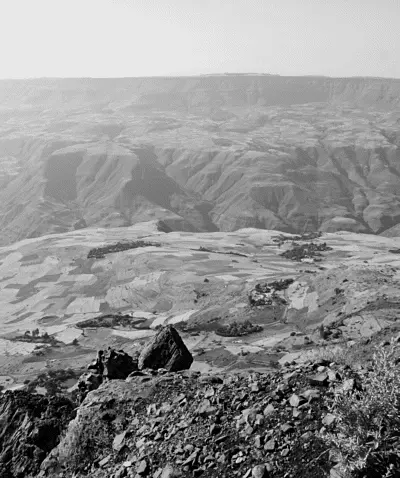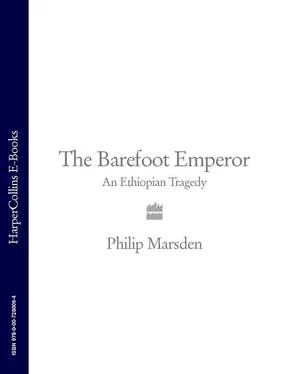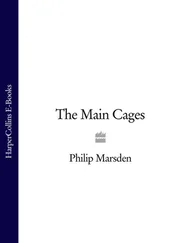1 ...7 8 9 11 12 13 ...19 Tewodros’s success lay not just in an astonishing series of military victories. He had something of that curious mystique that gathers round certain men, the impression that just a little of God’s energy flows directly through them. Although it failed to convince many of the old nobility, Tewodros’s charisma was more effective than any number of big guns, and remained with him throughout all the heady years of his reign, surviving his caprices, his violence, his self-destructive manias, the eventual depletion of his forces, and even his death.

Jidda gorge
7
Down in the heat of the Jidda gorge, Walter Plowden waded across the thigh-deep river and began to climb. High above him, some 4,000 feet, were the cliffs of the Delanta plateau. Up there was Tewodros’s camp, with his 50,000 soldiers and 100,000 followers. As the slope steepened, so the paths filled. The British consul passed scouts and sutlers, fell into step with water-carriers, wood-carriers, mules laden with grain, shepherds and stockmen driving their beasts to feed the emperor’s troops. Once he reached the plateau a group of mounted generals came out to escort him in to camp. Flautists played beside them. Drummers beat their goatskin tympana. As the party approached the open ground at the heart of the camp, with its reception tent, a volley of muskets was fired.
Inside, the consul blinked in the sudden darkness. As his eyes adjusted, he saw the emperor for the first time.
Tewodros was sitting on a divan, dressed in gold-threaded robes. The imperial crown lay on a cushion beside him, hung with pendants of silver filigree. The sword of state was held above him. Abune Selama and the ichege sat on high chairs on either side. Standing in attendance were dozens of officers. Plowden lowered himself to the carpet.
The earlier portraits he gives of other nobles – Wube and Biru and Merso, even Ras Ali – make them all larger than life. But none was painted with the same fascination as that of Tewodros. Plowden was at once struck by his physique – his fitness, his poise and his youth. His face was powerful and handsome, with thin lips and hair running back down to his shoulders.
Plowden stayed two weeks in the Delanta camp, and afterwards wrote an extensive report for his impatient masters at the Foreign Office. It remains one of the most detailed portraits of Tewodros at any stage, but certainly in this moment, in the first months after his coronation, flushed with his own success.
Tewodros, wrote Plowden, ‘is young in years, vigorous in all manly exercises, of a striking countenance peculiarly polite and engaging when pleased, and mostly displaying great tact and delicacy’. Like most observers, Plowden noted his energy. ‘Indefatigable in business, he takes little repose night or day; his ideas are clear and precise; hesitation is not known to him.’
Plowden’s reception showed the value Tewodros placed on ceremony and form. Yet his personal instincts were towards simplicity and equality. ‘He salutes his meanest subjects with courtesy,’ the consul wrote, ‘he is generous to excess and free from all cupidity.’
Tewodros’s plans were common currency in the camp, and Plowden stressed to London how important he could become in the politics of the Red Sea. ‘Next year he will devote to the settlement of Tigray, including the tribes along the coast, and meditates upon the occupation of Massawa.’ He would reclaim Ethiopia’s northern and western borders, the territory annexed by Egypt. ‘Nor does his military ardour hesitate to dream of the conquest of Egypt, and a triumphant march to the Holy Sepulchre.’ In this, as in all his actions, the emperor believed he was merely fulfilling the course of divine will: ‘His faith is signal.’
Plowden’s assessment of Tewodros was not blind to his faults. ‘The worst points in his character are, his violent anger at times, his unyielding pride as regards his kingly and divine right, and his fanatical religious zeal.’ It was, wrote Plowden, ‘impossible for him yet to believe that so great a monarch as himself exists in the world’.
Plowden proposed again the establishment of official relations between the two countries. He offered Tewodros the chance to send an embassy to London, in return for recognition of himself as consul. The treaty signed by Ras Ali contained in it clauses for his successor. So now Tewodros too could claim its benefits: There shall be a firm, mutually cordial and lasting friendship between the king of Abyssinia and his successors and Victoria, the queen of England and her successors …
When Plowden began to talk of this treaty, Tewodros said he knew nothing of it. ‘I am young and inexperienced in public affairs,’ he explained coyly.
So Plowden sketched out the mechanics of a consulship, the rights it gave Tewodros to send his own representation to Queen Victoria, to the court of St James’s, and the principle of mutual exemption from local laws. He spoke of the benefits of such an arrangement, the military aid that would accrue, assistance, trade. Plowden recognised in Tewodros an openness, a yearning for new ideas and contacts. But the emperor’s generals were impatient to return to battle. Every minute Tewodros wasted with this foreigner gave the enemy an advantage.
It was John Bell who relayed the emperor’s reply: I cannot consent to a consul, said Tewodros. I cannot allow anyone in my territory, consul or not, to be free from my jurisdiction. Plowden was devastated – even Ras Ali had agreed to that.
‘For anything else you wish for,’ Tewodros assured him, ‘now and hereafter, for yourself or other English, I shall be happy to perform your pleasure.’
Plowden felt sure that Tewodros would relent in time. He was used to waiting – he would wait a little longer. He travelled to Gondar to sit out the rains.
Tewodros moved his army south, towards the Christian kingdom of Shoa. The king of Shoa died the night before he was due to fight. The arrival of Tewodros with Abune Selama combined with the sudden death of their king to persuade the Christians of Shoa that a new age lay before them, and that Tewodros was its fiery exponent. Shoa was added to Gojjam and Wollo, Begemder and Gondar, Simien and Tigray. The territory of Ethiopia was now larger than it had been for over a thousand years.
8
Tewodros signalled the start of his reign with a series of stirring proclamations.
‘Go now,’ he told his followers, ‘lay down your arms, return to the country of your fathers. Take up the tools of your former trade.’ The merchant will abide in his store, the farmer in his field. He himself – Tewodros, Elect of God – will keep an army and they will be trained matchlockmen, and he will drill them and train them in the use of their arms. Soldiers will be paid and they will buy food from the peasants and no longer plunder farm stores. All guns not in their hands will be smelted into plough-shares and sickle-blades, and in the markets across the land the price of the plough-ox will exceed that of the war horse. Seek out the habits of peace, said the new emperor, live with your family, continue your old peacetime occupation unless it was as a shifta in which case, like Adonibezek who was pursued from the city of Bezek, you will have your hands and feet chopped off.
There shall be no more slavery. Existing slaves must be sold, the money given to charity, and the slaves baptised. Tewodros himself showed the way by buying slaves from the Muslim traders and sending them to priests for baptism. He encouraged others to follow him in formalising their marriage before the priests and to remain faithful to their chosen partners. Women of the camps and of the towns and of tella bets must no longer sell themselves to men. Murderers will not be handed over to the bereaved families for retribution, but dealt with by his own executioners. Tewodros revived the right of all citizens to approach him as the point of final appeal. Long before dawn, the cries of the persecuted surrounded his tent: ‘ Jan Hoi! Jan Hoi! Your Majesty! Give me justice!’
Читать дальше













